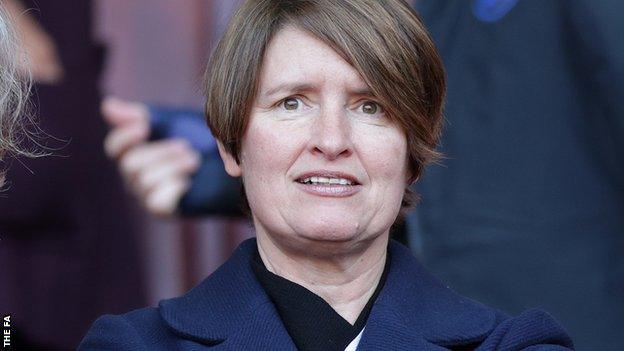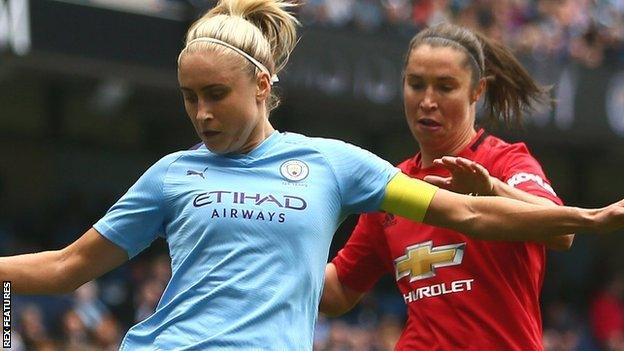Women's Super League: September targeted to start next WSL season - Kelly Simmons
- Published

Kelly Simmons said it is hoped this season's Women's FA Cup can be completed
England's top women's leagues are planned to start next season on 5-6 September, after final league placings for 2019-20 were confirmed on Friday.
Chelsea were named Women's Super League champions via a points-per-game system, Liverpool were relegated and second-tier leaders Aston Villa were promoted.
The WSL and Women's Championship seasons were halted in March because of coronavirus, and ended on 25 May.
It is expected that the new season would start behind closed doors.
The women's transfer window would now open on 19 June and close on 10 September, the Football Association's head of league operations Lauren O'Sullivan has said, while clubs' pre-season training would provisionally begin in July.
Kelly Simmons, the FA's director of the women's professional game, said: "We looked if we could come back earlier, but we want to put in place the right pre-season for the players. We want to make sure we protect them from injury, having been out for so long.
"That [5-6 September] is a Fifa men's international fixture slot at the moment. That's when we launched [the season] last year and had a fantastic impact.
"The other thing about August is it looks like the Uefa Women's Champions League completion tournament might land there, so that's one to watch."

The added interest in women's football after England's run to the 2019 World Cup semi-finals swelled attendance figures for the opening round of WSL fixtures in 2019-20 - more than 31,000 watched Manchester City beat local rivals United at Etihad Stadium
Simmons also said the FA still want to try to finish this season's Women's FA Cup, probably after the start of the 2020-21 season, but further talks were needed.
She said: "I am passionate about bringing it back and we have got to have a discussion with the women's football board next week, we have got to check in with Fifa about completing competitions in a different season.
"The reason I want to be back is we know that the Women's FA Cup delivers big audiences globally and domestically and it's the pinnacle, the highlight of the women's domestic calendar, and it would really help make sure we come back strongly and continue to put women's football back on the map."
How and why was the decision to end the campaign reached?
The FA formally ended the WSL and Championship seasons on 25 May after "overwhelming feedback from clubs", and Simmons stressed the issues were not purely down to finances.
"Obviously we were guided by government policy," she said.
"When you read through the protocols around coming back to training and understanding that some of the clubs don't own their own training grounds; one or two of them were in public venues that were shut.
"They are bringing third parties around their venue which needs to be bio-secure. There are some massive, massive challenges around coming back and in the Championship some additional challenges around full-time medics.
"We also spoke to the captains of all the clubs as well, and they had concerns about coming back, so when we looked at it in the round, it was an almost unanimous decision from the clubs to terminate the season, and focus resources and effort on coming back."
'Unfair to compare to women's game to men's'
Nevertheless, some have questioned the decision not to complete the 2019-20 women's seasons, including the shadow sports minister Alison McGovern MP, given that the men's Premier League and men's Championship are set to resume play later in June.
But Simmons says it is not fair to compare the men's professional game with the women's game, given that the WSL has only been full-time for two years.
"I'm often asked to compare the women's game with the men's professional game. The truth is that you can't," she said.
"The WSL is the only fully-professional women's league in Europe, and we're incredibly proud of how far it has come on, but we have to remember that it has only been professional for two seasons."
The Football Association has ring-fenced the £7m per year that the governing body invests in the WSL and Championship, despite the organisation needing to make cuts amid the pandemic.